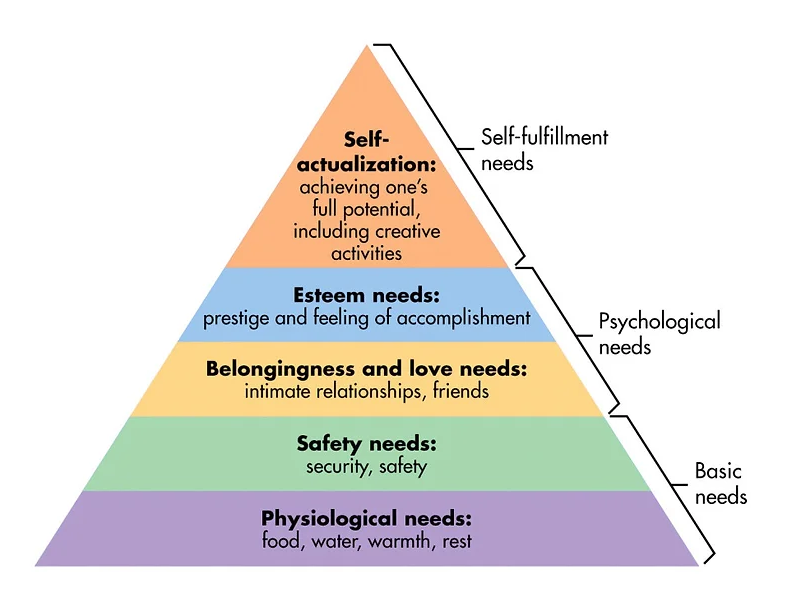
There is absolutely nothing more important than meeting our basic human needs” – Abraham Maslow
The key to happiness is meeting our needs. Although co-dependents are very good at meeting the needs of other people, they struggle to take care of their own needs. They have problems identifying, expressing, and fulfilling their needs and wants. They may be very attuned to the needs and desires of other people, even anticipating them. They become so accustomed to accommodating others that they lose touch with their own needs and desires over time.
The reason it is critical to meet our needs is that we experience emotional distress when they are not met. You may be in pain and have no idea why or which needs are not being met. When our needs are met, we feel happy, grateful, safe, loved, playful, alert, and calm. When they’re not, we’re sad, fearful, angry, tired, and lonely. Think about how you meet or don’t meet your needs, and what you might do to start meeting your needs.
It’s a simple formula, though difficult to carry out:
Meet Your Needs →→→ Feel Good
Ignore Your Needs →→→ Feel Bad
Similarly, Maslow’s hierarchy of needs is a theory that can be a useful tool for improving your overall health and wellbeing. According to Maslow, we have five categories of needs: physiological, safety, love, esteem, and self-actualization. A great deal of Maslow’s work was devoted to how people got the best from themselves.
The hierarchy is often presented as a pyramid.

Maslow’s original five-stage model has been adapted by other researchers to develop an eight-stage hierarchy of needs pyramid.
1. Biological and physiological needs – air, food, drink, shelter, warmth, sex, sleep, etc.
2. Safety needs – protection from elements, security, order, law, stability, freedom from fear.
3. Love and belonging needs – friendship, intimacy, trust, and acceptance, receiving and giving affection and love.
4. Esteem needs – which Maslow classified into two categories: (i) esteem for oneself (dignity, achievement, mastery, independence) and (ii) the desire for reputation or respect from others (e.g., status, prestige).
5. Cognitive needs – knowledge and understanding, curiosity, exploration, need for meaning and predictability.
6. Aesthetic needs – appreciation and search for beauty, balance, form, etc.
7. Self-actualization needs – realising personal potential, self-fulfilment, seeking personal growth. A desire “to become everything one is capable of becoming.
8. Transcendence needs – A person is motivated by values that transcend beyond the personal self (e.g. Experiences with nature, aesthetic experiences, service to others, the pursuit of science, religious faith, etc.).
Here are some ways you can start to meet those basic needs so that you can start to move up that pyramid.
- Eat Well.
- Get regular sleep.
- Exercise Regularly.
- Go to the Doctor.
- Practice Meditation.
- Speak up for Yourself.
- Improve Your Self-esteem
- Establish Good Boundaries.
- Be Part of a Group
- Remember to Have Fun
Finally, some needs require courage to stretch ourselves to meet them, such as self-expression, authenticity, independence, and setting boundaries. Other needs are interpersonal and require courage to ask other people to meet them. Recovery means identifying your emotions and needs, you can then take responsibility for meeting them and feeling better. It requires that we take responsibility for ourselves and develop enough self-esteem to prioritise ourselves. Small changes in your life can create a big ripple effect, and you may be surprised by how much happier, healthier, and alive you will feel as a result. Start listening to and honouring yourself by asking yourself what you want and need.
Sources
Lancer, D. (2019). Meeting Your Needs Is the Key to Happiness. Psych
Central. Retrieved on from
https://psychcentral.com/lib/meeting-your-needs-is-the-key-tohappiness/
Elevation Behavioral Health. (2017). Uncategorized Archives – Elevation Behavioral Health. Retrieved from https://elevationbehavioralhealth.com/category/uncategorized/
Maude, S. 9 Basic Needs We Must Meet to Feel Happy and Alive. Retrieved from https://tinybuddha.com/blog/9-basic-needs-we-must-meet-to-feel-happy-and-alive/ McLeod, S. (2020). Maslow’s Hierarchy of Needs. Retrieved from https://www.simplypsychology.org/maslow.html
Maslow, A. H. (1943). A theory of human motivation. Psychological Review, 50(4), 370-96.